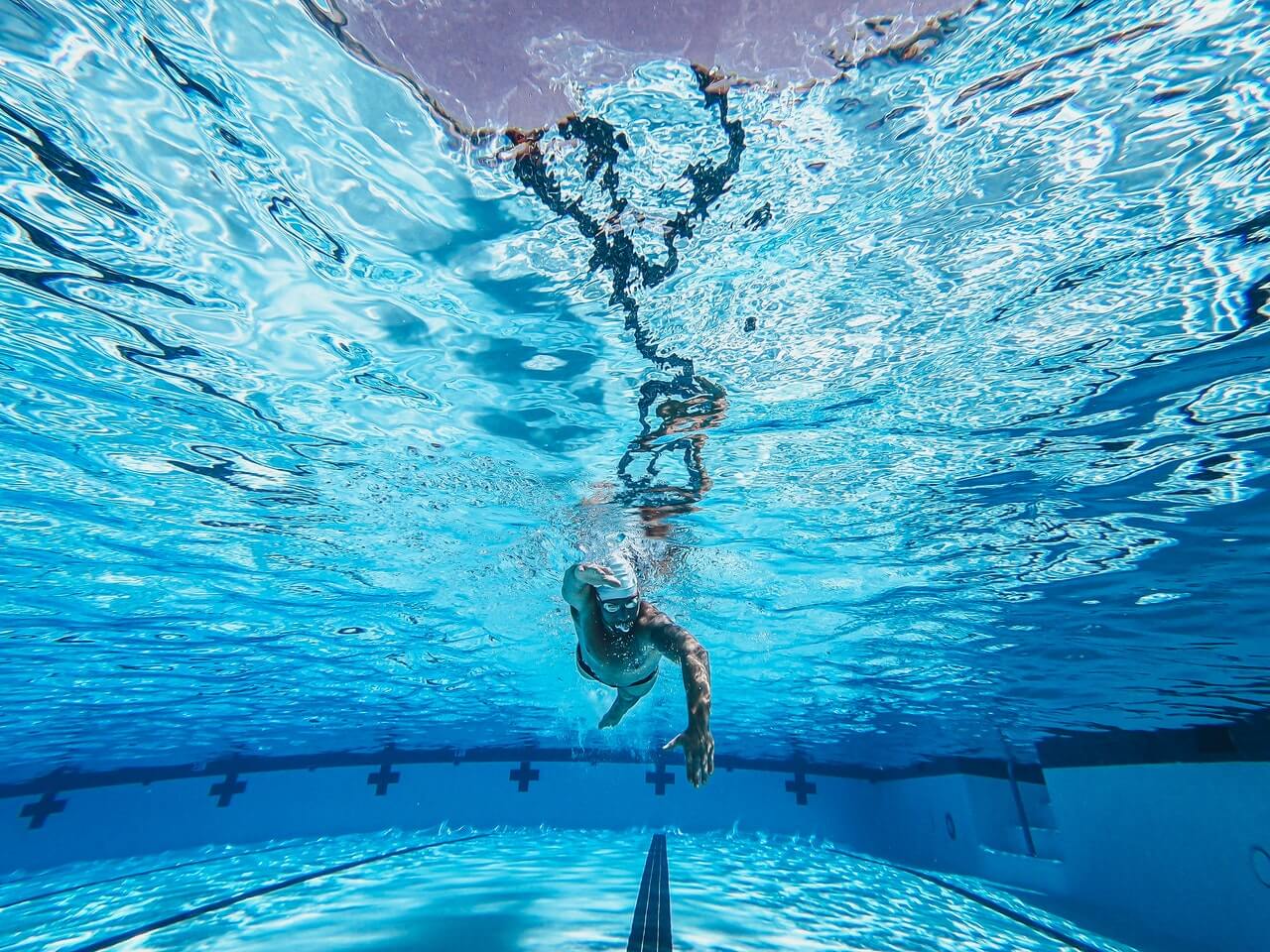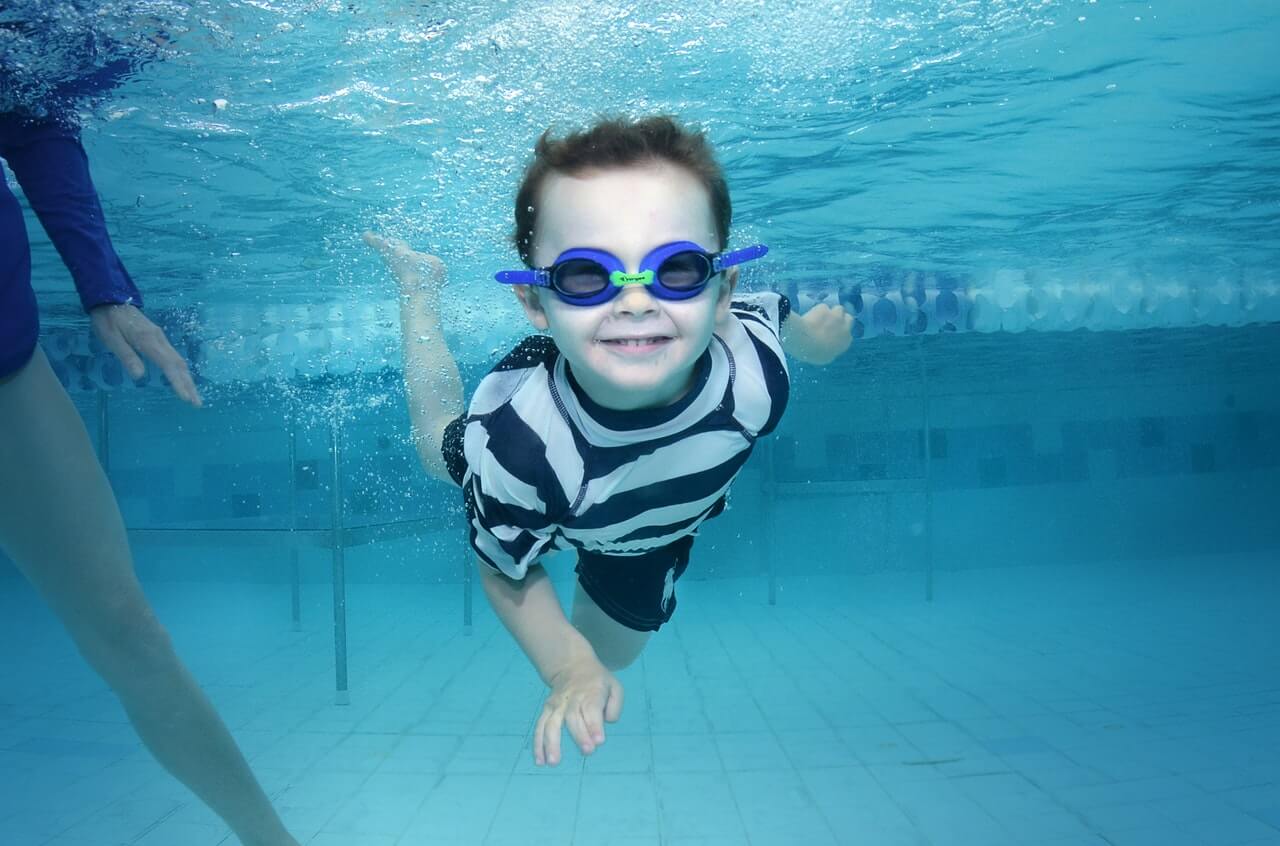The benefits of swimming are amazing and they’re available to the young and old alike. Whether you’re 3 or 103 years old, swimming can improve both your physical and mental health.
As swim school software providers, we wanted to understand the key benefits of swimming. So, we rolled up our sleeves and began sorting through the research. What we found surpassed our expectations.
Below, we’ll detail the top 9 benefits of swimming that we discovered. From boosting motor skill development in children to potentially extending your life-span, and much more!
Let’s dive in.

1) Swimming is a low-impact aerobic activity
Swimming offers an amazing full-body workout because of the gentle resistance that water provides. While swimming, you’re constantly pulling with your upper-body, kicking with your lower-body and maintaining stability and balance with your core muscles. Because these movements are continuous, swimming trains your muscular and cardiovascular endurance.
As a result, swimming consistently can help you enjoy balanced muscle development and improved cardiovascular strength. This means your body will become better equipped to handle strenuous daily activities. With stronger muscles supporting your frame, you may even notice a relief in common back pain or joint pain as you age!
As an added bonus for joints, swimming is a very low impact activity. So, in addition to improved muscular development, swimming is an activity that won’t escalate wear and tear on bones and joints. This means you can enjoy the benefits of swimming without the soreness or joint damage that other aerobic activities may bring.
2) Swimming can help you rehab injuries
One of the hardest parts about sustaining an injury is waiting while your body heals. When you’re forced to sit on the sidelines it can feel like you’re losing any health progress you previously made.
However, when you’re able to engage in light exercise as part of rehabilitating your injury, suddenly you feel involved in your healing process.
Swimming offers an excellent form of rehabilitation. Thanks to the buoyancy of water, swimming can minimize pressure on injured joints, ligaments, tendons, and muscles. That’s one of the reasons why the American College of Sports Medicine recommends “swimming, walking or running in the water” as a form of rehabilitation for sprains and strains, among other injuries.

Swimming also allows you to maintain or even strengthen supporting muscles which can further alleviate pain from injuries. And because swimming can burn up to 900 calories per hour, it can help injured individuals maintain a healthy bodyweight throughout the rehabilitation process.
3) Swimming is good for pregnant women
In the same way that an injury may cause someone to stop their recreational activities, pregnancy often requires expecting mothers to step back from playing sports. Although it’s often a protective measure, this decision can cause feelings of isolation during an already physically challenging time.
Indeed, for some, taking a break from sports may offer welcome rest for their changing bodies. But for others, being away from a sport they love can make them feel sedentary, restless, or even leave them feeling a loss of identity.
Swimming can help counteract these negative feelings and deliver numerous benefits.
Floating in water can immediately reduce back and joint pain and common foot and ankle swelling caused by carrying extra weight during pregnancy. It can also help reduce round ligament pain and sciatic pain that can accompany pregnancy too.
But above all else, swimming delivers a safe aerobic exercise. This not only promotes the maintenance of muscle and cardiovascular health, it provides an outlet for recreation. As a result, swimming can help curb feelings of isolation and instead foster connection to a new fitness community.
Plus, it’s good to get into the habit of going to the local pool, because swimming has some exceptional benefits for young children too!
4) Swimming promotes early childhood development
One of the benefits of swimming that you may not know, is that swimming can have a noticeable impact on early childhood development.

As parents, we know that swimming lessons can help young children socialize. We also know how important it is for our children to be able to swim and practice water safety. But research completed by Robyn Jorgensen Consulting in Australia has potentially found a new benefit of swimming.
In their research, Jorgensen’s group found that children who take swimming lessons were able to meet numerous development milestones ahead of their peers.
The study saw that young children who took swimming lessons scored “significantly better on measures that related to their visual motor skills (which includes skills such as cutting paper, colouring-in and drawing lines); gross motor stationery skills (eg. standing on tiptoes, standing on one foot, imitating movement, performing sit-ups); oral expression (being able to speak and explain things, etc.); and achieving in general areas of literacy and numeracy and mathematical reasoning.” These findings clearly suggest that young swimmers saw a marked advancement in their development when compared to their peers.
The study also notes that the quality of lessons did have an impact on the outcomes. Specifically, the higher quality of instruction, the more noticeable the advantage. With this in mind, the researchers ultimately suggest that the structured learning environment of the swim class helped children learn to follow instructions and more easily adapt to schooling environments.
Swim class can be especially beneficial for marginalized groups
The general educational benefits of swimming were also backed by Swim England.
In their commissioned report, they found that, “swimming is implicated in improving youth development and enabling educational success.” The English governing body also found that, “[t]hese contributions may be especially salient for marginalized or disenfranchised groups.” From these findings we can see that swimming can be an important vehicle to help young kids overcome obstacles and find success in the education system.
It’s important to note that both studies state that more research needs to be done in order to confirm these findings. However, the early indications are clearly worth pursuing!
5) Swimming can help children with asthma
If your child has asthma, swimming can greatly help them manage their condition.

A 2009 study in the health journal, Respirology, found that children who completed a six-week swimming program in addition to their regular asthma treatments “showed significant improvement in all clinical variables including symptoms, hospitalizations, emergency room visits and school absenteeism.” These impressive findings can be life changing for children who struggle with asthma.
When children are able to stay in the classroom and out of the hospital, their confidence grows. By staying engaged with their education, friends and family, they feel included and involved in their community. Not to mention, the fewer trips to the hospital, the more confident they’ll be in strength of their own lungs.
The study explains that, “Unlike other sports, swimming is unlikely to provoke asthma attacks.” There are obvious benefits to avoiding asthma attacks, but the study found that the benefits of swimming go beyond that. By practicing swimming, children with asthma can enjoy normal physical development including, “increasing lung volume, developing good breathing techniques and improving general fitness.” In this way, swimming doesn’t just keep them out of the hospital, it can actually strengthen their lungs too!
Most importantly, the benefits of this six-week swimming program were found to last at least one year after the program was completed. And that’s truly remarkable.
6) The mental health benefits of swimming
We’ve had indications about the mental health benefits of swimming for decades. In 1983, a Brooklyn College study of 100 college students found that “swimmers reported significantly less tension, depression, anger, confusion, and more vigor after exercising.” These swimmers displayed that swimming can simultaneously shed stress while boosting a person’s mood.

Similarly, a 2012 poll with fieldwork conducted by Ipsos MORI on behalf of Speedo, found that 73% of those surveyed agreed that swimming helps relieve stress. And a further 70% agreed that swimming had a positive mental health impact, leaving them feeling refreshed.
These results align with mental health findings for general exercise as well. According to researchers at the University of Nebraska Medical Center, “exercise improves mental health by reducing anxiety, depression, and negative mood and by improving self-esteem and cognitive function.” So, it should be no surprise that people report feeling positive mental health benefits after swimming. But, perhaps one of the most advantageous elements of swimming is the cost.
Swimming is an affordable practice
Outside of swimming lessons for people who don’t know how to swim, swimming can be extremely affordable. It’s free to swim in a natural lake, river, ocean, or even a friend’s pool. And many public pools offer free swims or are priced to welcome people from all socio-economic backgrounds. For this reason, swimming can be an incredibly affordable way to boost a person’s mood, reduce anxiety and leave them feeling positive.
In Britain, the general public seems to have caught on to this trend. As swimming.org explains, “swimming has significantly reduced the symptoms of anxiety and depression for 1.4 million adults in Britain.” That is a massive number of people reaping the mental health benefits of swimming. In fact, with so many swimmers enjoying a greater level of mental health in Britain, it’s fair to say that swimming may even carry societal benefits!
8) Improved bone health
Bone health is one of the most important factors for enjoying a long health-span. As a person ages, their bones naturally get weaker. These weaker bones are much more prone to breaks and fractures.
When you combine this decrease in bone health with the natural decrease in mobility as a person grows older, it’s easy to understand how the elderly can end up in the hospital after a fall. Of course, the recovery time required to heal a broken bone can lead to a further decrease in mobility, which can increase the cycle of deteriorating health. But swimming can help prevent this cycle from even beginning.
Swimming doesn’t increase bone density the same way that other weight-bearing exercises do. However, a systematic review of 64 scientific studies has shown that swimming still makes important contributions to bone health.
The review’s authors explain that, “swimmers present a higher bone turnover than sedentary controls that may result in a stronger structure and consequently in a stronger bone.” By increasing bone turnover, swimmers can more quickly replace defective or damaged bone tissue with younger, stronger tissue. As result, the bone can become stronger and help better protect the integrity of bones in older swimmers.
Another way that swimmers protect their bones is by developing muscle. The development of muscle helps stabilize and protect joints. This can aid in maintaining balance and mobility for the elderly.
As one 2016 Australian study reported, elderly men who swim were 33% less likely to experience a fall, compared to men who did other forms of exercise, such as golf, calisthenics, working out on treadmills or stationary bikes. This means elderly swimmers were more likely to be able to stay active and maintain a high quality of life.
9) Swimming is a life-long activity for a longer life
Swimming doesn’t just improve quality of life for the elderly, it may also extend it!
A 2008 study conducted by researchers at the University of Carolina followed over 40,000 men aged 20-90 for more than 30 years. The study found that men who swam had a 53% lower risk of all-cause mortality than those who were sedentary. That’s an astounding decrease in risk!
Far more impressive, however, was that swimmers also showed a 49% lower risk of all-cause mortality than runners. This clearly indicates that the benefits of swimming are unique. If an aerobic activity like running can’t match the decrease in all-cause mortality that swimming offers, then there’s undoubtedly something special about swimming.

Swim England has made similar findings about the protective qualities of swimming. According to their work completed in 2017, swimming lowers the risk of early death by 28%, and it also lowers the risk of death due to heart disease and stroke by 41%. These findings clearly illustrate that swimming may just lengthen your life!
But, perhaps the most important part about this finding is the quality of life. Given all the benefits of swimming, we know that this extended lifespan can be lived in a state of good health. And that’s something to celebrate!
The Benefits of Swimming are for Everyone
Swimming is an activity that the whole family can benefit from. Thanks to the gentle resistance that water provides, swimming can increase muscular and cardiovascular strength. The low-impact nature of swimming also makes it an excellent practice to help rehab injuries, keep people active, and increase lung capacity for kids with asthma.
The mental health benefits of swimming are amazing too. Swimming can boost a person’s mood, keep them feeling connected and potentially boost childhood development.
Above all else, swimming is proven decrease risk of heart disease and early death. Plus, it may even extend your lifespan, which means more swimming and more benefits to enjoy!
Do you know of any more benefits of swimming?
If so, we’d love to hear from you! Feel free to reach out and let us know on Facebook, Twitter or Instagram!








